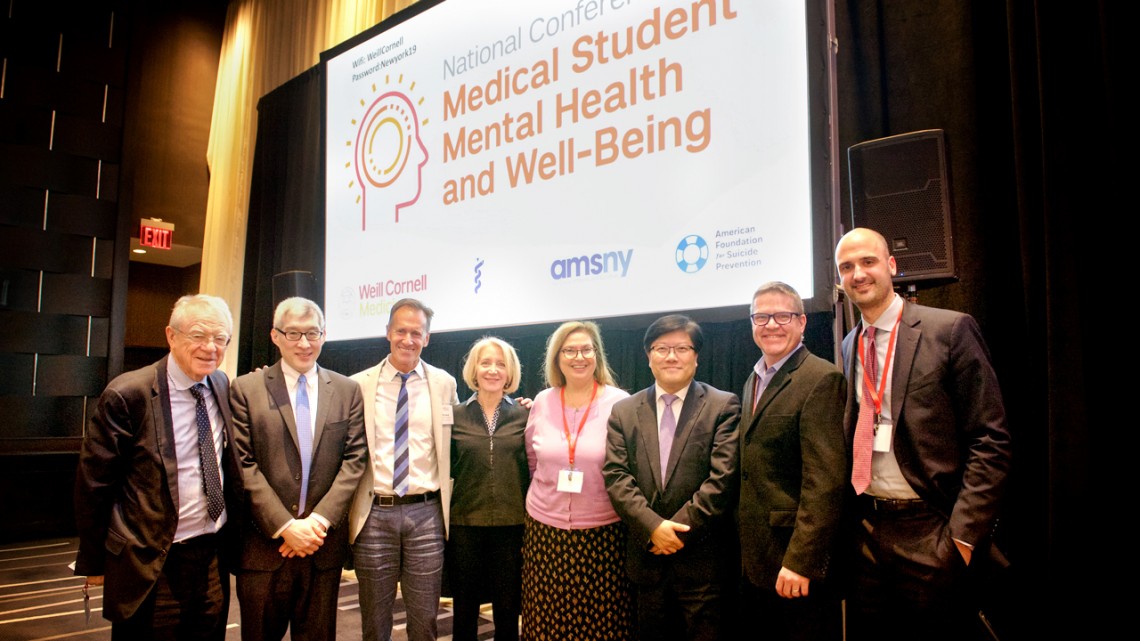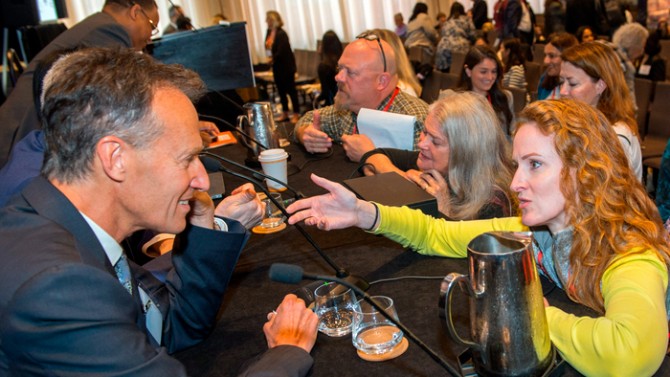
Panelists from the National Conference on Medical Student Mental Health’s closing session Sept. 19, from left: Dr. Herbert Pardes of NewYork-Presbyterian, Dr. Francis Lee and Dr. Richard Friedman of Weill Cornell Medicine; Dr. Lisa Mellman of Columbia University Vagelos College of Physicians and Surgeons; Dr. Sibel Klimstra of Weill Cornell Medicine; Dr. Augustine M.K. Choi, dean of Weill Cornell Medicine; Dr. Thomas Koenig of Johns Hopkins University School of Medicine; and Dr. Jonathan Avery of Weilll Cornell Medicine.
Weill Cornell hosts medical student mental health conference
By Brian Mastroianni
The inaugural National Conference on Medical Student Mental Health and Well-Being, held Sept. 18-19 at Weill Cornell Medicine, began with a call to action.
“Arguably, medicine is the most noble profession, and we have to intervene so we’re not placing so much stress on our students and preventing them from becoming the best doctors they can be,” Dr. Augustine M.K. Choi, the Stephen and Suzanne Weiss Dean of Weill Cornell Medicine, told an audience of more than 350 medical school educators, students and researchers assembled at the Manhattan Ballroom of the Grand Hyatt hotel in New York City.
The two-day conference was hosted by Weill Cornell Medicine, in partnership with the Association of American Medical Colleges, Associated Medical Schools of New York and the American Foundation for Suicide Prevention. It was designed to address the increasing rates of psychological distress among medical students nationwide, and spotlighted the findings of leading mental health researchers, clinicians and educators while giving a needed platform for students and stakeholders to destigmatize the conversation around mental health.
The symposium provided a safe space for frank discussions about what the medical school climate has been like in the past, where it is now and what needs to change for the future.
Discussions ranged from reassessing how medical schools handle the stresses of exams to student suicides to the challenges faced by students who are underrepresented in medicine.
The first day’s presentations included the work of Dr. Francis S. Lee, chair of the Department of Psychiatry at Weill Cornell Medicine and psychiatrist-in-chief at NewYork-Presbyterian/Weill Cornell Medical Center, who demonstrated his digital cognitive behavioral therapy (CBT) app designed to help teens and young adults learn behavioral skills to address anxiety and depression.
Interest in this kind of tech is high, given rising rates of anxiety and depression among students nationwide. Lee said statistics show that more than 60% of people between the ages of 14 and 22 download mobile apps to treat their mental health. Retaining these young users is a challenge, he said, since many drop these apps after initial interest. Audience questions at the end also underscored continuing debates over whether these kinds of apps are more useful as a complement to in-person therapy.
Dr. Richard A. Friedman, professor of clinical psychiatry and the director of the Student Mental Health Program at Weill Cornell Medicine, touched on the age-old question of whether medical students can “have it all”: mental health and resilience.
He said the objective for administrators should be to not only better identify and treat mental illness, but to “help foster resilience” in medical students. Given the rising demand for mental health services that we see in our students, he said, “we need to provide more resources.”
A session on student suicide prevention provided a range of perspectives on addressing an especially difficult topic on medical school campuses. Dr. Christine Moutier, chief medical officer for the American Foundation for Suicide Prevention, said officials in academic medicine have to “become the helpers who are walking the walk of what science is telling us.”
Later in the session, Timothy C. Marchell ’82, director of the Skorton Center for Health Initiatives at Cornell Health, framed suicide as a public health issue requiring a comprehensive approach to prevention, including restricting access to means of suicide. Cornell’s approach also includes correcting the misconception of the university’s Ithaca campus as a “suicide school,” a myth that has resulted from at-times sensationalist media reporting of past suicides.
At the end of the conference, Choi revisited his call for change and expressed his hope that there would be more conferences like this to come.
“There’s an urgency to this. All social justice takes time,” Choi said. “This is an area in which we need to have a sense of urgency and we need all of you to move forward.”
Read a longer version of this story on the Weill Cornell Medicine website.
Brian Mastroianni is a freelance writer for Weill Cornell Medicine.
Media Contact
Get Cornell news delivered right to your inbox.
Subscribe

